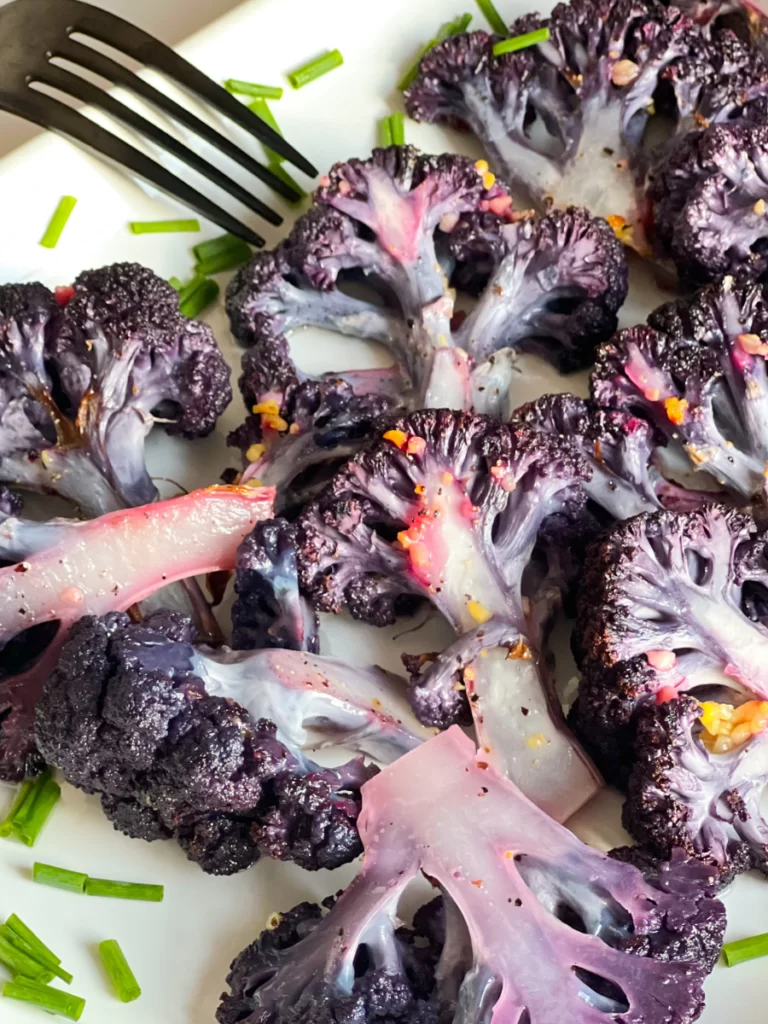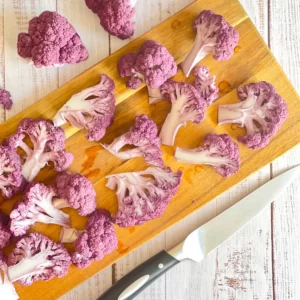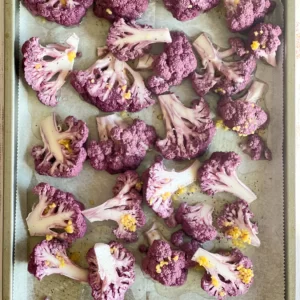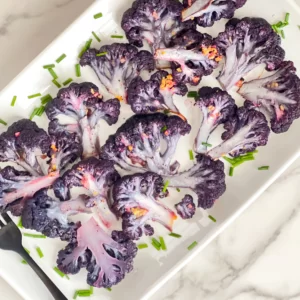Oven Roasted Purple Cauliflower Recipe


Oven Roasted Purple Cauliflower Recipe
Description
Don’t worry! It’s not fake! It is completely natural. Its purple color comes from the antioxidant found in red cabbage and red wine: anthocyanin. When a lot of heat and sunlight hits the developing cauliflower, it can display a purplish tinge along the edges of the head. Colored cauliflowers ( purple, orange, green…) started popping up at farmers markets about ten years ago and it’s become increasingly popular and available in the last few years.
Cauliflower is a cruciferous vegetable that is a significant source of nutrients like vitamins and minerals, containing almost every vitamin and mineral you need. Cruciferous vegetables are vegetables such as cauliflower, cabbage, kale, broccoli, Brussels sprouts, and similar green leaf vegetables. Cauliflower is low in calories yet high in vitamins (vitamin C, K, B6), minerals (potassium, manganese, magnesium, phosphorus), antioxidants, and fiber.
Purple cauliflower is available year-round, with a peak season in the late summer and fall months. But if you can’t find it, you can always use white cauliflower as a substitute. This is a straightforward, healthy, and tasty recipe that can be a great side dish or a healthy snack. You can make the same recipe in the air fryer if you don’t have time.
Ingredients
How to cook purple cauliflower
-
Preheat the oven to 400 F degrees.
-
Whisk olive oil, garlic, salt, and pepper in a small bowl.
-
Clean and cut the cauliflower head into bite-size florets. Put them in a big bowl and toss with the olive oil mixture to coat.

-
Line a baking pan with parchment paper. Arrange the cauliflower florets on the prepared baking pan.

-
Roast for 20-25 minutes until they are lightly charred. Serve immediately!
Bon Appetit!

Note
Tips to Oven Roasted Purple Cauliflower:
1- Preparing the purple cauliflower:
Select the fresh and firm purple cauliflower heads for the best results. If you have to store it in the refrigerator for a while and if you have some discolored parts, simply cut them off.
Removing any leaves and tough stems, cut the cauliflower head into bite-size florets and wash them.
2- Seasoning:
Olive oil, garlic, salt, and pepper! It is just that simple. But you can create your own recipe by adding red pepper flakes, paprika, dried rosemary, and lemon juice according to your taste.
3- Oven roasting techniques:
Preheat the oven to 400 degrees Fahrenheit. Place the cauliflower florets on a baking sheet in a single layer for proper air circulation and for evenly browning.
4- Serving suggestion:
Serve immediately! You can garnish with herbs like chopped fresh parsley. It can be a great side dish or a healthy snack by itself.
Frequently Asked Questions
Purple cauliflower is interchangeable with white cauliflower in taste and texture, so any recipe you have that calls for cauliflower can be swapped with no adverse effects.
Purple cauliflower behaves a bit like purple cabbage when you cook it. Meaning, it always needs a bit of acid to keep the vibrant purple color. When you cook it or roast it, the color will fade into a blue-ish tint, but just add a bit of acid at the end to revive the lovely purple hues.
It turns a darker hue of purple. The anthocyanins in purple cauliflower leach out in water which dulls it's color; color is better retained with dry heat such as roasting, grilling, or sautéing.
Purple cauliflower can be chopped into individual florets and eaten raw, displayed on appetizer platters, tossed into salads, or blended into fruit smoothies as a thickener.
A cauliflower head with colorful pigments is still perfectly safe to eat. Indeed, they are richer in beneficial antioxidants than white cauliflower. There are cauliflower cultivars that are purple, orange, light green and yellow, although we generally prefer them white. No need for concern.
Purple cauliflower offers up a mild and slightly sweet flavor, with subtle differences in taste when compared to white cauliflower. The heads of the purple varieties are tenderers and have a milder taste. This purple-hued fresh cauliflower provides nutty nuances, earthy and crunchy, with their heavy, dense small heads being compact and super clean.
Purple cauliflower is the healthiest option, with numerous advantages. The purple hue is due to the antioxidants called anthocyanins. These are the pigments present in various other plants and plant-based products, including red cabbage and red wine.



